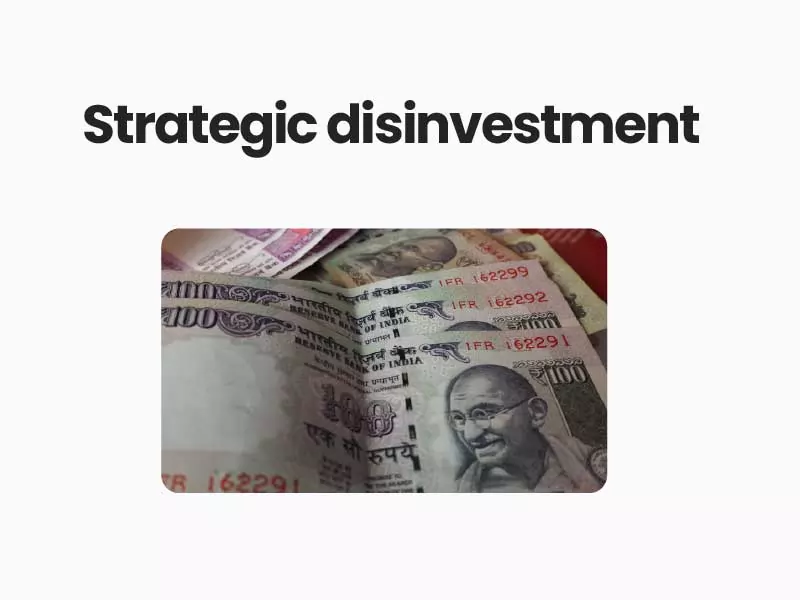Companion@360 → 7 Month programme to sharpen your writing skills → REGISTER NOW

What is Strategic disinvestment?
Simply, strategic disinvestment is transferring the ownership and control of a public sector entity to some other entity (mostly to a private sector entity). Unlike the simple disinvestment, strategic sale implies some sort of privatisation.
The disinvestment commission defines strategic sale:
“Strategic disinvestment would imply the sale of a substantial portion of the Government shareholding of a central public sector enterprise (CPSE) of up to 50%, or such higher percentage as the competent authority may determine, along with transfer of management control.”
Disinvestment policy in India- salient features of the Policy
- Public Sector Undertakings are the wealth of the Nation and to ensure this wealth rests in the hands of the people, promote public ownership of CPSEs
- While pursuing disinvestment through minority stake sale in listed CPSEs, the Government will retain majority shareholding, i.e. at least 51 per cent of the shareholding and management control of the Public Sector Undertakings
- Strategic disinvestment by way of sale of a substantial portion of government shareholding in identified CPSEs up to 50 per cent or more, along with transfer of management control.
Department of Investment and Public Asset Management
- The Department of Disinvestment was one of the Departments under the Ministry of Finance. It was renamed as Department of Investment and Public Asset Management (DIPAM) from 14th April 2016.
- DIPAM has been made the nodal agency for disinvestment.
- DIPAM and NITI Aayog will now jointly identify PSUs for strategic disinvestment.
Advantages of strategic disinvestment
- Improving the structure of incentives and accountability of PSUs in India.
- Financing the increasing fiscal deficit.
- Financing large-scale infrastructure development, defence, education, healthcare etc.
- For investing in the economy to encourage spending.
- Brings about greater efficiencies for the economy and markets as a whole.
- Bring relief to consumers by way of more choices and better quality of products and services, e.g. Telecom sector.
- For retiring Government debt- since a big part of Centre’s revenue receipts go towards repaying public debt/interest.
- To encourage wider share of ownership in an enterprise, and reduce monopoly like enterprises.
- To depoliticize non-essential services and move out of non-core businesses, especially ones where the private sector has now entered in a significant way.
- It also sends a positive single to the market and can boost economic activity.
Read Now Electoral Reforms in india
Concerns
- Process of disinvestment is not favoured socially as it is against the interest of socially disadvantageous people.
- Political pressure from left and opposition.
- It is argued that the government is selling profit-making enterprises and is weakening the public sector.
- Job security and the welfare of workers will be another issue.
- Loss-making units don’t attract investment so easily.
- Over the years, the policy of divestment has increasingly become a tool to raise resources to cover the fiscal deficit with little focus on market discipline or strategic objective.
- Sometimes the emergence of private monopolies, consumer welfare will be reduced.
- It is argued that mere change of ownership, from the public to private, does not ensure higher efficiency and productivity.
- It may lead to retrenchment of workers who will be deprived of the means of their livelihood.
- The private sector, governed as they are by the profit motive, has a tendency to use capital-intensive techniques which will worsen the unemployment problem in India.
- Fiscal 2016-17 is the seventh year in a row where the government is not meeting the disinvestment target fixed in the Budget.
Way Forward
- Define the priority sectors for the government based on its strategic interests.
- Investment in PSUs has to be in terms of the generation of adequate social and strategic returns.
- The government ownership is required for sectors with strategic relevance such as defence, natural resources, etc. and the government should, exit from the non-strategic sectors such as hotels, soaps, airlines, travel agencies, etc.
- The government should look into strengthening the regulatory framework that ensures efficient market conditions.
- Instead of creating PSUs, the government should create regulations that would ease the entry of new players. The regulations should also ensure that the basic necessities of the consumers are met.
- Allowing both domestic and foreign buyers to bid freely for stakes.
Current affairs for UPSC Check Now
